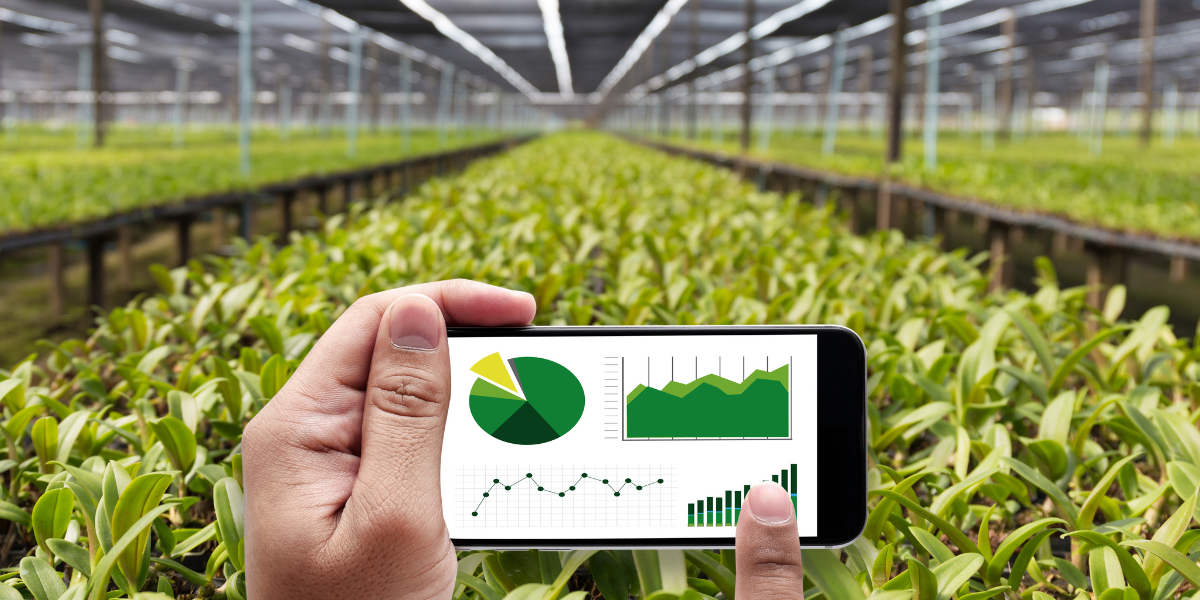AI on the farm: Five applications taking hold in agriculture

The public release of AI-powered generative text platform ChatGPT in 2022 sparked a new age of AI globally.
For the first time, the public had access to sophisticated AI models that could be integrated into people’s work, education and personal lives – from generating grocery lists to solving calculus equations.
Forward-thinking business leaders were quick to adopt burgeoning AI capabilities to boost efficiency wherever possible. American farmers have also begun using AI in their daily operations for a wide variety of tasks.
In this article, we share five unique uses of AI in farming and food production operations.
But first, how do we define AI?
Artificial intelligence has become a catch-all term for technology that can learn, read, write, create and analyze to help humans understand sophisticated concepts or solve problems.
Related: Is your background in data analytics? Consider a career in agribusiness.
Under the AI umbrella, some technologies are better classified as machine learning (technologies specifically designed to learn and improve at a task) or internet of things (IoT), which involve multiple technologies integrating and communicating with each other to complete a task.
Many of the technologies being implemented on America’s farms fall into one of these categories.
Five ways farmers have begun using AI to improve efficiency and increase yields:
- Plant and insect identification:
Farmers are now utilizing image recognition software that can instantly recognize plants and insects, enabling rapid and accurate identification.
This is helpful in a variety of ways, the most important of which being a time saver for when a farmer needs information to treat crops with pesticide or herbicide.
If you have accurate readings on insects affecting crops or plant health in general, you can also leverage AI tools to determine the right mix of pesticides, herbicides or fertilizers to best support healthy growth.
- Mapping:
To care for a large piece of farmland, accurate maps are a crucial component to planting and/or maintenance.
Now, AI-powered tools enable yield mapping by utilizing data from sensors, satellites and drones to analyze crop productivity variations across fields.
Once mapped, similar AI tools can be used to determine which areas of a farm need water more than others and initiate the irrigation process automatically.
- Predictive maintenance:
AI algorithms can now analyze sensor data from agricultural machinery and equipment, predicting potential failures before they occur.
By identifying maintenance needs in advance, farmers can minimize downtime, reduce repair costs and optimize the performance and lifespan of their agricultural machinery, ensuring uninterrupted operations and maximizing productivity in the field.
- Robotics:
Drones equipped with AI technology are now being used widely to efficiently monitor crops, detect pests and diseases, assess plant health and even perform tasks like crop spraying or seeding.
Similarly, cultivation robots powered by AI autonomously perform tasks like planting, weeding and harvesting crops, which are starting to address endemic labor shortages spanning the agriculture industry.
Related: Key takeaways from the 2023 ACG AgTech Investor Symposium
- Insights:
Real-time insights in agriculture are provided by AI algorithms that process data from various sources such as sensors, drones, satellites and online weather forecasts.
These algorithms analyze data on factors like soil moisture, crop health, weather conditions and market trends, enabling farmers to make informed decisions promptly.
Real-time insights also help optimize irrigation, crop management, resource allocation and harvesting schedules, ultimately improving agricultural efficiency, productivity and profitability.
The takeaway:
AI has ushered in a new age of productivity reaching most, if not all, industries – including agriculture.
The uses listed above show how in-depth these capabilities have grown just in the past year.
We anticipate advancements will continue to grow more profound and specialized in the months and years ahead, especially as food demand continues to increase around the world.
If you’re interested in learning more about AgTech, contact Eric Spell at (336) 217-9116 or eric.spell@charlesaris.com.
SIMILAR ARTICLES
Meaningful conversations: How our deal-sourcing team connects with founders
We launched our transaction services business with the guiding philosophy that meaningful conversations lead to successful deals.
The new era of workplace wellness at Charles Aris
Throughout the past year, we’ve also integrated firmwide activities into our culture to promote healthy meditation, social events and exercise.
Charles Aris in the community
Our firm places a high value on giving back to our communities, and our team members have been working alongside several organizations to do so.


